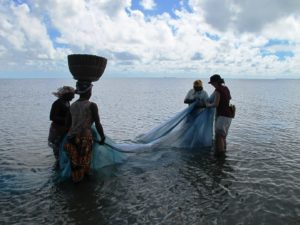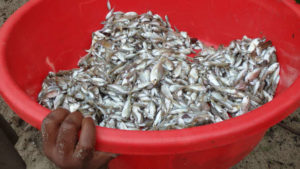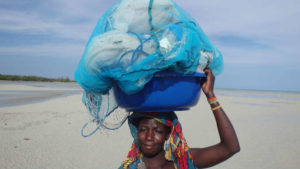This #World oceans Day, Dr Rebecca Short from the University of Exeter Medical School, European Centre for Environment and Human Health (ECEHH) talks to us about her PhD research focusing on gender roles in coastal fishing communities in Mozambique.
Words by Dr Rebecca Short, Research Associate, ECEHH, University of Exeter

I did not know that the women of Cabo Delgado, Mozambique would be so central to my PhD research when I began investigating the coastal fishing communities of this remote part of the country. I was there to take a first look at an issue that has been in the background for a long time, but seldom a main focus for those interested in fisheries; the use of mosquito nets as fishing gear. This is assumed to be a terrible idea. By putting your net in the water with a goal of feeding your family or making a small income you are not only reducing protection from malaria-carrying mosquitoes, but also jeopardising the future sustainability of the fishery by sieving the fragile coral reef waters of fish of any size. This has been much discussed, though little scrutinised, with the result usually being to make it illegal – the case in Mozambique despite this impacting some of the poorest people. This I did know when I began and I must admit I presumed was a necessary evil to preserve the fish stocks for future generations.
It was therefore a bit of a surprise when on my very first day in the city of Pemba, having some lunch near the beach, when I saw a group of women very obviously fishing with their bright blue mosquito nets right by the shore. Surely this was quite risky? When I arrived in the much smaller villages north of the city which were to be my focus much of the same; women in the shallow waters, up to about chest height fishing with several mosquito nets sewn together in groups of three or four. Some days, groups of women fishing as far as the eye could see. Not an objection to be heard or fisheries official to be seen.
My first objective was to try to understand better the who, what, why and how of mosquito net fishing the only way I could think of; by going fishing with them. Whilst making a complete idiot of myself by apparently hauling in the net like a hapless baby, I saw a totally different side of the activity; it was fun. The groups of women were clearly good friends and laughed and joked whilst fishing (with or without my influence I should mention). This, I reflected, was in such contrast to their other main occupation of farming where they spend much of their time alone or with family on a small plot of land.
Early on in my research it was obvious there was more to it for women in what is a very conservative, patriarchal culture. Enabled by the free availability, lack of necessary fishing skills, and importantly perception of mosquito net fishing as acceptable ‘women’s work’ this has become their opportunity to make their own money (which can be more likely to contribute to community development than patriarchal income), to feed their children what is actually particularly a nutritious meal (Kawarazuka & Béné, 2011), and of course a chance to have a break from the demands of their families! On top of this they had figured out their own economics; allotting catch according to net ownership, friendship loans of cash and food, and divisions of labour. Generating their own small industry. The significance of this should not be underestimated. Mozambique was recently rated 15th lowest in the world in the Girl’s Opportunity Index (Save The Children, 2016), and Cabo Delgado so remote from the capital of Maputo has some catching up to do with the rest of the country. Girls grow up here told that their best bet at a good life is to find a good husband, though divorce is not uncommon. To have an independent way to support your family can be more than survival but a way out of abject poverty.
If you’re wondering where the men are in this story – good question. I couldn’t really find them, and this alludes to the crux of the issue with mosquito net fishing. Because the men were using mosquito nets for fishing, you just probably won’t see them. They are further offshore, fishing with much bigger nets adapted for use over coral reefs where they would normally snag and tear, fishing in bigger groups with much larger catch sizes. This is what is seen as the problem with mosquito net fishing. Accordingly, a taboo is attached to this activity which does not exist for the women and the men hide what they are doing.
These differences are well known to the local people, and women fish so brazenly because they are not seen as a threat to the fishery. Yet nowhere in my preparation for this research, within the media, peer review literature or indeed by talking to officials did this come up. And I shouldn’t have been surprised – women are so often excluded from fisheries research. This may be because globally they play mostly secondary roles as traders, processors or indeed cooks. But even primary activities such as mosquito net fishing and what is probably one of the most widespread activities in small-scale fisheries, gleaning, are routinely disregarded in management and policy formation, whatever the governance system. This is reflected in research which focuses almost exclusively on male fisheries. But we are wising up! The field of gender and fisheries, and indeed gender and the oceans is rapidly growing. Not just as an area of interest, but driven by our increasing understanding of the critical role women play in successful development, conservation and sustainable management.

As I continue my research, both further in to mosquito net fisheries elsewhere and also more generally in to links between the oceans and human health with the SOPHIE project at ECEHH, I know that gender will be a key focus for me. Importantly I also believe it should be a key focus in all research of this kind; whilst I may seem obvious to us now that leaving out half of the picture leads to terrible policies and results we have several centuries of half-baked research to backfill with the full picture!
You can find out more about Rebecca’s research and the European Centre for Environment and Human Health here.
#ExeterMarine is an interdisciplinary group of marine related researchers with capabilities across the scientific, medical, engineering, humanities and social science fields.
Find us on: Facebook : Twitter : Instagram : LinkedIn
If you are interested in working with our researchers or students, contact Michael Hanley or visit our website!
